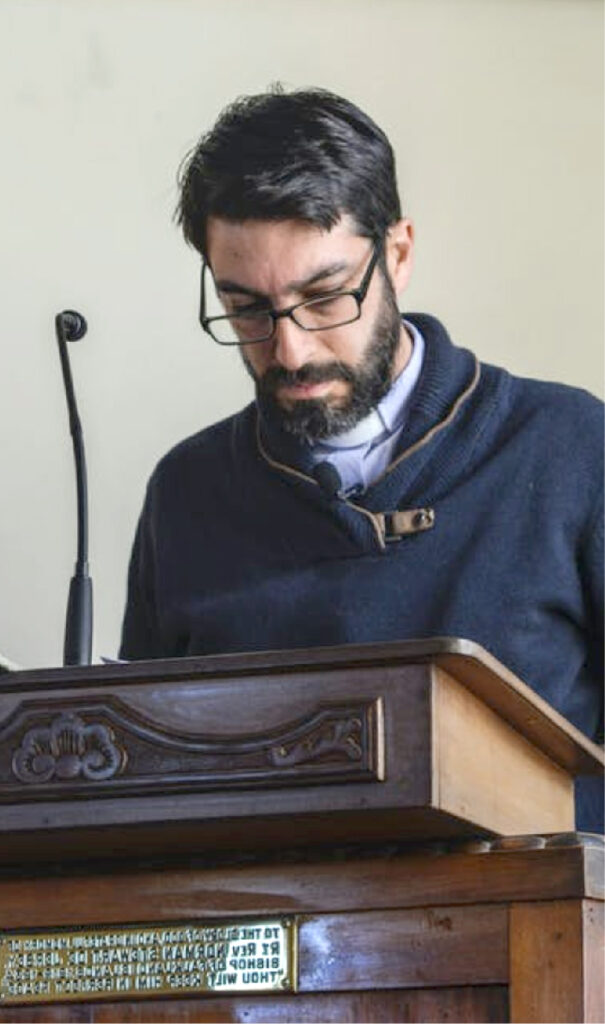Pastoral Ministry Track
Master of Letters, Customized for Ministry
Our Master of Letters in Classical Protestantism, Pastoral Ministry Track, offers a unique and low-cost alternative to an M.Div, partnering with churches, presbyteries, and dioceses to re-imagine the shape of theological education. Our online and residential courses provide students with a unique grounding in the theological, biblical, historical, philosophical, and linguistic foundations of the Protestant faith. Meanwhile, your ecclesial mentors provide, life-on-life on-the-ground training in the practical skills, experience, and character traits needed for pastoral ministry.
Elements of Our Program
Our M.litt, Pastoral Ministry Track program is a three-year, 78-credit course of study that could serve as an alternative to an M.Div. or MATS program at a seminary. As a confessional institution, we require that Pastoral Ministry students choose a tradition-specific sub-track. For now, we are offering Anglican Studies, and Reformed and Presbyterian Studies; we hope to add a Baptist Studies track in Fall 2023. Most courses are online-only, meeting 2hrs./wk. for 10 wks, but our Foundations module includes residential intensives and recorded lectures.
Looking for a program aimed at laymen instead?
If you’re not pursuing pastoral ministry, but are looking for a firm grounding in the theological, biblical, historical, philosophical, and linguistic foundations of the Protestant faith, check out our regular M.Litt program
Tuition
For OUr M.LItt Program
For full-time Pastoral Track students, the total cost of our program is just $10,898, including full room and board at two 2-week Residential Intensive courses. Part-time students pay somewhat more, but still much less than any comparable programs.
Full-Time vs. Part-Time
Degree-seeking students can, like non-degree seeking students, register for individual courses on a term-by-term basis and apply these credits to their degree, so long as they fulfill all degree requirements within six years of matriculation (exemptions for longer periods of completion may be granted on a case-by-case basis by appeal to the Provost). The standard rate for such classes is $399 for most 1.5-credit classes, and $623 for 2-credit language classes. However, full-time students (those taking at least four and ideally five classes per term) pay at a lower rate: $275 for 1.5-credit classes and $436 for 2-credit language classes.
Full-time students also have the option to pay tuition for each year in advance at the rate of $4,150 per year (residential courses paid separately), which represents an additional 18% discount off of the regular full-time discount, and a steal compared to comparable graduate and seminary programs!

Required Core Courses
All M.Litt. students take these eight courses, which constitute the heart of the unique Davenant approach to retrieving the legacy of classical Protestantism, with an emphasis on reformed catholicity and the integration of God’s “two books” ― Scripture and nature.
Natural Law and Scriptural Authority
An introduction to the shared Catholic-Protestant natural law tradition and how Scripture both presupposes it and illuminates it.
Philosophy for Theology
An introduction to the basic philosophical grammar necessary to understand the tradition of Western theology.
The Reformation and the Modern World
Why was the Reformation necessary? Was it all for the good? And how has it shaped our world today?
Introduction to Protestant Moral Theology
A primer on how to render obedience to God’s law and stay faithful to the order of creation.
Approaches to Defending the Faith
A survey of different apologetical schools and how to cultivate ourselves as defenders of the faith today.
Philosophy as a Way of Life
A rediscovery of the true nature of philosophy as appropriated by Christianity: a search for wisdom in the light of Christ.
How to Read the Bible and the World
A residential intensive exploring how we learn from both God’s Word and God’s world, and how to discern the structure and key themes of each.
A Protestant Christendom?
A residential intensive offering a Reformational approach to the intersection of political and spiritual authority.
Confessional Sub-Tracks
Students can choose from the following two options (others to be added in future years, Lord willing).
These six courses will be substituted for general elective requirements in the Theology and Christian History modules.
Anglican Studies Track
6 Courses
History
Anglican Church History I
Anglican Church History II
Theology
Thirty-Nine Articles
Anglican Theology (rotating focus)
Further Study
Anglican Polity
Anglican Liturgy
OR
Reformed & Presbyterian
Studies Track
6 Courses
History
Continental Reformed Church History
British Reformed Church History
Theology
Reformed Confessions
Reformed Theology (rotating focus)
Further Study
Reformed Polity
Reformed Liturgy
OR
Baptist Studies Track
6 Courses
History
Baptist History I: Europe
Baptist History II: United States
Theology
Baptist Confessions
Baptist Theology (rotating focus)
Further Study
Baptist Polity
Baptist Liturgy
traiNing for Pastors — By Pastors
Throughout their three years of study, students work with an ecclesial mentor—whether it’s their senior pastor, diocesan bishop, or other designated leader—to acquire the skills, experience, and character needed for on-the-ground ministry.
For the Practicum part of our program, students will be given our Pastoral Practicum Guide outlining the following requirements. Each term, students will check in with Davenant on their progress.
- Students should meet with mentors regularly throughout their program to discuss a specific list of topics aimed at preparing them for ministry.
- Students will engage in regular or frequent supervised ministry throughout their program.
- Students are required to preach a sermon or equivalent public teaching opportunity six times during their program. Students are encouraged to attend a Simeon Trust Workshop, which will count towards a year of mentorship and two sermons.

Faq
Have additional questions? Get in touch!
Davenant Hall iS Reimagining
Theological Education.
Would you like to join us? We’d love to hear from you. If you have any further questions about the M.Litt. Pastoral Track or the application process, don’t hesitate to reach out.
